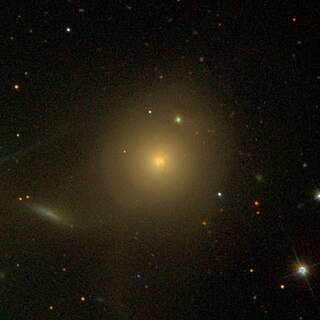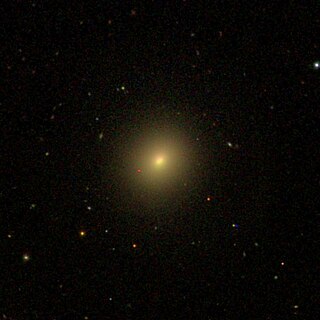
NGC 3632 and NGC 3626 is an unbarred lenticular galaxy and Caldwell object in the constellation Leo. It was discovered by William Herschel, on 14 March 1784. It shines at magnitude +10.6/+10.9. Its celestial coordinates are RA 11h 20.1m, dec +18° 21′. It is located near the naked-eye-class A4 star Zosma, as well as galaxies NGC 3608, NGC 3607, NGC 3659, NGC 3686, NGC 3684, NGC 3691, NGC 3681, and NGC 3655. Its dimensions are 2′.7 × 1′.9. The galaxy belongs to the NGC 3607 group some 70 million light-years distant, itself one of the many Leo II groups.

NGC 5821 is a spiral galaxy with a ring structure in the constellation Boötes. It lies near a similarly massed galaxy, NGC 5820, at the same redshift. Both galaxies were discovered by the astronomer William Herschel.

NGC 12 is an intermediate spiral galaxy in the Pisces constellation. It was discovered by William Herschel on December 6, 1790.

NGC 31 is a spiral galaxy located in the constellation Phoenix. It was discovered on October 28, 1834 by the astronomer John Herschel. Its morphological type is SB(rs)cd, meaning that it is a late-type barred spiral galaxy.

NGC 5890 is an unbarred lenticular galaxy in the constellation Libra. It was discovered in April 1785 by Ormond Stone.

NGC 38 is a spiral galaxy in the constellation Pisces. It was discovered in 1881.

NGC 4780 is an intermediate spiral galaxy within the constellation Virgo. It is located about 166 million light-years away from the Sun. It was discovered in 1880 by the astronomer Wilhelm Tempel.

NGC 7499 is an unbarred lenticular galaxy within the constellation Pisces. NGC 7499 is its New General Catalogue designation. It was discovered on September 2, 1864 by the astronomer Albert Marth.

NGC 467 is an unbarred lenticular galaxy in the constellation Pisces. It was discovered on 8 October 1785 by William Herschel.

NGC 75 is a lenticular galaxy estimated to be about 260 million light-years away in the constellation of Pisces. It was discovered by Lewis A. Swift from the USA in 1886 and its magnitude is 13.2.

NGC 5985 is a spiral galaxy located in the northern constellation Draco. NGC 5985 was discovered by William Herschel in 1788.

NGC 113 is an unbarred lenticular galaxy located in the constellation Cetus. It was discovered by German astronomer, Ernst Wilhelm Leberecht Tempel, on August 27, 1876.

NGC 115 is a barred spiral galaxy located in the southern constellation of Sculptor. It was discovered by the British astronomer John Herschel on September 25, 1834. The galaxy is approximately 85 million light-years from the Sun, and is about 50,000 light-years in diameter, nearly half the size of our home galaxy, the Milky Way.

NGC 178 is a Magellanic spiral galaxy in the constellation of Cetus. The compiler of the New General Catalogue, John Louis Emil Dreyer noted that NGC 178 was "faint, small, much extended 0°, brighter middle". It was discovered on November 3, 1885 by Ormond Stone.

NGC 116 is a possibly lost or "non-existent" object in the constellation Cetus. This object is up for debate and has been considered to possibly be PGC 1671. The NED entry for this object contains the note NGC identification is very uncertain.

NGC 164 is a spiral galaxy located in the constellation Pisces. It was found by the German astronomer Albert Marth on 3 August 1864.

NGC 479 is a spiral galaxy in the constellation Pisces. It was discovered by German astronomer Albert Marth on October 27, 1864. It is about 240 million light-years away from Earth.

NGC 485, also commonly referred to as PGC 4921 or GC 270, is a spiral galaxy in the constellation Pisces. It is located approximately 86 million light-years from Earth and was discovered on January 8, 1828 by astronomer William Herschel. It was later also observed by Heinrich d'Arrest and Herman Schultz. When NGC 485 was originally categorized in the New General Catalogue by John Louis Eil Dreyer in 1888, it was incorrectly described as a "considerably faint, pretty large, round, 8th magnitude star 3 1/2 arcmin to southwest".

NGC 5201 is a spiral galaxy located in the constellation Ursa Major. It was discovered on April 14, 1789 by German-born British astronomer William Herschel. It is about 384 million light years away.
NGC 7812 as is an intermediate spiral galaxy in the constellation Sculptor. The galaxy was discovered on 25 September 1865 by Sir John Hershel. At its widest, it measures approximately 100-thousand light years across, and is 315 million light years away from Earth.



















